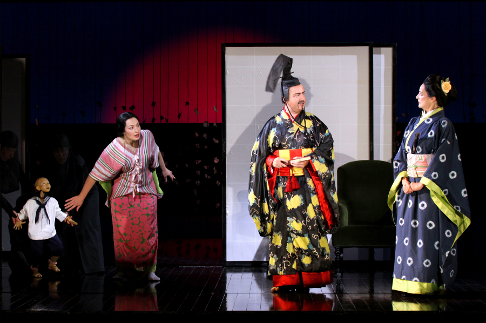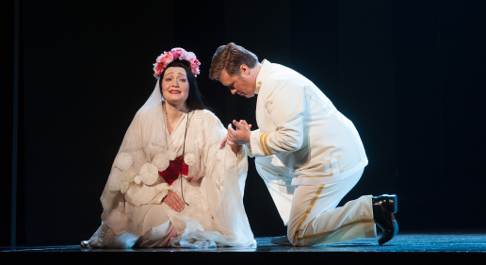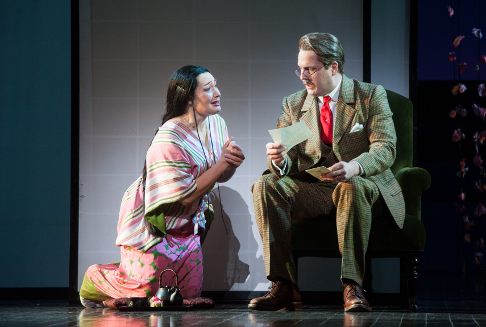![Blind Summit pupeteer and Pamela Helen Stephen as Suzuki [Photo by Robert Piwko]](http://www.operatoday.com/ENO_Butterfly_03.png)
22 Oct 2013
Madame Butterfly at ENO
First seen in 2005, and since feted in London (several times), New York and Lithuania, Anthony Minghella’s cinematic production of Madame Butterfly remains a breath-taking visual banquet.
English Touring Opera are delighted to announce a season of lyric monodramas to tour nationally from October to December. The season features music for solo singer and piano by Argento, Britten, Tippett and Shostakovich with a bold and inventive approach to making opera during social distancing.
This tenth of ten Live from London concerts was in fact a recorded live performance from California. It was no less enjoyable for that, and it was also uplifting to learn that this wasn’t in fact the ‘last’ LfL event that we will be able to enjoy, courtesy of VOCES8 and their fellow vocal ensembles (more below …).
Ever since Wigmore Hall announced their superb series of autumn concerts, all streamed live and available free of charge, I’d been looking forward to this song recital by Ian Bostridge and Imogen Cooper.
Although Stile Antico’s programme article for their Live from London recital introduced their selection from the many treasures of the English Renaissance in the context of the theological debates and upheavals of the Tudor and Elizabethan years, their performance was more evocative of private chamber music than of public liturgy.
Evidently, face masks don’t stifle appreciative “Bravo!”s. And, reducing audience numbers doesn’t lower the volume of such acclamations. For, the audience at Wigmore Hall gave soprano Elizabeth Llewellyn and pianist Simon Lepper a greatly deserved warm reception and hearty response following this lunchtime recital of late-Romantic song.
For this week’s Live from London vocal recital we moved from the home of VOCES8, St Anne and St Agnes in the City of London, to Kings Place, where The Sixteen - who have been associate artists at the venue for some time - presented a programme of music and words bound together by the theme of ‘reflection’.
'Such is your divine Disposation that both you excellently understand, and royally entertaine the Exercise of Musicke.’
‘And there was war in heaven: Michael and his angels fought against the dragon; and the dragon fought and his angels, And prevailed not; neither was their place found any more in heaven … that old serpent … Satan, which deceiveth the whole world: he was cast out into the earth, and his angels were cast out with him.’
There was never any doubt that the fifth of the twelve Met Stars Live in Concert broadcasts was going to be a palpably intense and vivid event, as well as a musically stunning and theatrically enervating experience.
‘Love’ was the theme for this Live from London performance by Apollo5. Given the complexity and diversity of that human emotion, and Apollo5’s reputation for versatility and diverse repertoire, ranging from Renaissance choral music to jazz, from contemporary classical works to popular song, it was no surprise that their programme spanned 500 years and several musical styles.
The Academy of St Martin in the Fields have titled their autumn series of eight concerts - which are taking place at 5pm and 7.30pm on two Saturdays each month at their home venue in Trafalgar Square, and being filmed for streaming the following Thursday - ‘re:connect’.
The London Symphony Orchestra opened their Autumn 2020 season with a homage to Oliver Knussen, who died at the age of 66 in July 2018. The programme traced a national musical lineage through the twentieth century, from Britten to Knussen, on to Mark-Anthony Turnage, and entwining the LSO and Rattle too.
With the Live from London digital vocal festival entering the second half of the series, the festival’s host, VOCES8, returned to their home at St Annes and St Agnes in the City of London to present a sequence of ‘Choral Dances’ - vocal music inspired by dance, embracing diverse genres from the Renaissance madrigal to swing jazz.
Just a few unison string wriggles from the opening of Mozart’s overture to Le nozze di Figaro are enough to make any opera-lover perch on the edge of their seat, in excited anticipation of the drama in music to come, so there could be no other curtain-raiser for this Gala Concert at the Royal Opera House, the latest instalment from ‘their House’ to ‘our houses’.
"Before the ending of the day, creator of all things, we pray that, with your accustomed mercy, you may watch over us."
The doors at The Metropolitan Opera will not open to live audiences until 2021 at the earliest, and the likelihood of normal operatic life resuming in cities around the world looks but a distant dream at present. But, while we may not be invited from our homes into the opera house for some time yet, with its free daily screenings of past productions and its pay-per-view Met Stars Live in Concert series, the Met continues to bring opera into our homes.
Music-making at this year’s Grange Festival Opera may have fallen silent in June and July, but the country house and extensive grounds of The Grange provided an ideal setting for a weekend of twelve specially conceived ‘promenade’ performances encompassing music and dance.
There’s a “slide of harmony” and “all the bones leave your body at that moment and you collapse to the floor, it’s so extraordinary.”
“Music for a while, shall all your cares beguile.”
The hum of bees rising from myriad scented blooms; gentle strains of birdsong; the cheerful chatter of picnickers beside a still lake; decorous thwacks of leather on willow; song and music floating through the warm evening air.
![Blind Summit pupeteer and Pamela Helen Stephen as Suzuki [Photo by Robert Piwko]](http://www.operatoday.com/ENO_Butterfly_03.png)
First seen in 2005, and since feted in London (several times), New York and Lithuania, Anthony Minghella’s cinematic production of Madame Butterfly remains a breath-taking visual banquet.
The sumptuous splendour of Michael Levine’s opulent sets and Han Feng’s eye-catching costumes is an optical feast, and the tableaux and choreographed sequences, particularly those which open and close the opera, retain their gasp-rendering thrill. The japonaiserie is meticulous and authentically minimalist: low wooden dwellings, rooms like paper boxes, sliding doors and walls silently gliding into infinite formations, tea trays laid decorously on tatami mats. The kaleidoscopic array of geishas’ gowns and ceremonial headgear, set against the deep carmine of the rising sun or the emerald glow of green moonlight, is stunning.
Yet, so much of the design seems to me convey an idealised, Orientalist perspective, casting a Western eye on Japanese culture, underpinned by a score which is innately Eurocentric. Like Pinkerton, we are tourists in a foreign land, and perhaps guilty of indulging in what Edward Said described as a ‘Western style for dominating, restructuring and having authority over the orient’.
 Dina Kuzenetsova as Madam Butterfly, Alun Rhys-Jenkins as Goro and Pamela Helen Stephen as Suzuki [Photo © Robert Piwko]
Dina Kuzenetsova as Madam Butterfly, Alun Rhys-Jenkins as Goro and Pamela Helen Stephen as Suzuki [Photo © Robert Piwko]
The stunning skills of the puppeteers of Blind Summit astonish us with their eye-deceiving dexterity and the scenes which Minghella crafts have an undeniable visual exquisiteness; but, such pictures are essentially static, hypnotising the onlooker and drawing attention away from the emotional drama which unfolds through the music. For example, at the end of Act 1 the long duet of Butterfly, fearful of love’s fragility, and Pinkerton, unthinkingly indifferent to her terrors, touches us with less immediacy than does the sculptured landscape of disorientating paper moons and pendant floral fronds — trails of starry necklaces against the night sky. It is as if the flimsy tale of a love disregarded and betrayed cannot bear the ‘weight’ of the artistic realisation of the director’s lavish visual imagination.
It is, in fact, Peter Mumford’s marvellous lighting design which so magnificently generates the production’s shimmering exoticism, injecting drama into the pictorial vistas. Mumford crafts a constantly shifting world, one of appearances rather than materiality: wondrous, yet elusively insubstantial. He fashions a maze of interwoven reflections which extend upwards to the night sky and slithers downwards along Levine’s glimmering sloping stage. Despite the production’s Eurocentrism, the shifting images and shadows which Mumford sets in motion suggest a more authentic East, as they flicker and flutter across the mirror surfaces, as elusive and ambiguous as Butterfly’s own identity. In a land where power is in the hands of men, and women are valued only as the transient objects of male passion, the mirroring echoes both evoke a dreaming air, and also suggest Butterfly’s own search for the identity imposed upon her by, and reflected in, the eyes of others — that is, as she endeavours to become the object of Pinkerton’s fantasy.
 Dina Kuznetsova as Madam Butterfly and Timothy Richards as Pinkerton [Photo © Thomas Bowles]
Dina Kuznetsova as Madam Butterfly and Timothy Richards as Pinkerton [Photo © Thomas Bowles]
Thus, Butterfly is herself a ‘puppet’ — as the blood-red kimono sashes with which the dancers encircle her immobile form confirm. But, Mumford’s lighting can hint emotional depths; in the aforementioned duet, for example, as the petals flicker fleetingly, they recall the hannabi displays so familiar of Japanese summer nights — their flowery fire is often multiplied by the dark waters above which they explode — and perhaps suggest the flame of passionate devotion which blazes in Butterfly’s heart.
Ironically it is the passive, self-abnegating Madame Butterfly, sung with seductive ease by Russian-American soprano Dina Kuznetsova, who in this production proves the strongest character; for while Japanese women are traditionally required to be compliant and submissive, it is Dina Kuznetsova and Pamela Helen Stephen, as her maid Suzuki, who vocally dominate the proceedings. Making her ENO debut, Kuznetsova used her warm, full voice to convey Butterfly’s tender devotion and constancy. Although perhaps somewhat mature for the role, she convinced and moved hearts: her soprano is ripe with Romantic lyricism, and full of dusky hues, but as she shows in the second Act, she can also spin a gorgeous pianissimo. Most impressively, she communicated every word of the text; for once the surtitles were largely redundant.
Kuznetsova’s haunting performance, and excellent diction, was matched by Pamela Helen Stephen’s characterful Suzuki; she had enormous stage presence, and in Act 3’s ‘Già il sole!’ the range and impact of the emotions conveyed was striking, from sorrowful resignation to helpless dismay.
Sadly, as Pinkerton Timothy Richards was less engaging. Also making his house debut, Richards sang sturdily but with little vocal diversity or musical characterisation. He displayed an unfortunate tendency to ‘shout’ at emotional highpoints, in order to be heard about the full orchestral surges. George von Bergen was a bumbling American Consul Sharpless, but dramatically and vocally he also seemed rather adrift; his voice was sufficiently resonant but at times lacked focus. And, the diction of both male leads was poor.
 Dina Kuznetsova as Madam Butterfly and George von Bergen as Sharpless [Photo © Thomas Bowles]
Dina Kuznetsova as Madam Butterfly and George von Bergen as Sharpless [Photo © Thomas Bowles]
There were solid performances from Alun Rhys-Jenkins (Goro) and Alexander Robin Baker (Prince Yamadori); and Mark Richardson was fittingly imperious and formidable as Butterfly’s uncle, The Bonze, with a ferocious bite to his bark. Catherine Young made a strong impression as Kate Pinkerton.
Butterfly’s child is a bunraku-inspired, sailor-suited puppet-child; but while we marvel at the deftness of the black-costumed manipulators who imbue the marionette with uncanny veracity, the singularity of this lone puppet results in a distancing of our affections. The alien child seems strangely material and unyielding, at odds with the evanescence of the rest of the production.
There was another ENO debut in the orchestra pit, with conductor Gianluca Marciano taking the helm; the ENO orchestra gave a reliable performance but one which did not altogether capture the emotional heaves and peaks of the score.
In the final reckoning, Minghella’s visual alchemy casts its spell but it is Kuznetsova who makes the magic work. In Act 3, the lyrical force of her melodic utterances conquers the marvellous but, at times, diverting imagery; and, seduced, discarded and forgotten, her unwavering resolution makes up for the absence of consistently powerful dynamics between the other characters. Kuznetsova convinces us that, despite her assertion that she is now American, Butterfly — in re-enacting her father’s ritual suicide — is killed by the compelling, ineffaceable social mores of her own culture.
Claire Seymour
Madame Butterfly continues in repertory until 1 December.
Cast and production information:
Butterfly, Dina Kuznetsova; F.B. Pinkerton, Timothy Richards; Sharpless, George von Bergen; Suzuki, Pamela Helen Stephen; Goro Alun, Rhys-Jenkins; The Bonze, Mark Richardson; Prince Yamadori, Alexander Robin Baker; Kate Pinkerton, Catherine Young; Director, Anthony Minghella; Revival Director, Sarah Tipple; Original Associate Director & Choreographer, Carolyn Choa; Set Designer, Michael Levine; Costume Designer, Han Feng; Original Lighting Designer, Peter Mumford; Revival Choreographer, Anita Griffin; Puppetry, Blind Summit; Conductor, Gianluca Marciano; Translator, David Parry. English National Opera, London Coliseum, Monday 14th October 2013.